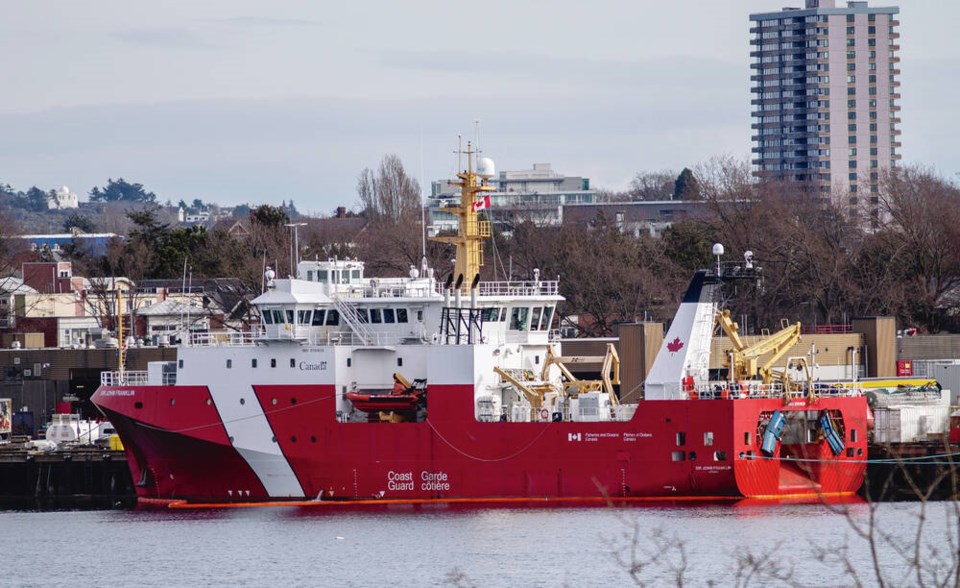The Canadian Coast Guard’s Sir John Franklin is slated to leave Victoria today to join an international high seas scientific expedition charged with learning how climate change is affecting declining populations of wild Pacific salmon.
“Climate change and its impacts on the North Pacific Ocean are exposing Pacific salmon to conditions well outside their normal climate cycles,” Jackie King, chief Canadian scientist for the expedition, said in a statement. King is based in Nanaimo at Fisheries and Ocean’s Pacific Biological Station. “Through this expedition, we are building our knowledge of how salmon are impacted by these changes.
“Nothing short of an international effort, such as the one we’re undertaking with the International Year of the Salmon is needed to build this knowledge in the hopes of ensuring Pacific salmon for future generations.”
The International Year of the Salmon is a five-year initiative, governed in the Pacific by the North Pacific Anadromous Fish Commission.
A chartered fishing vessel, Raw Spirit, is scheduled to leave Port Alberni early next week to take part in the expedition, and will be sampling a similar area to the Franklin in the Gulf of Alaska but with different gear. A U.S. vessel and a Russian vessel are already at sea. The ships will be sampling in different zones in the North Pacific.
The Pan-Pacific Winter High Seas Expedition is the largest such venture ever undertaken. More than 60 scientists are taking part.
It comes as B.C. has seen drastic drops in its commercial salmon catches three years in a row.
Five countries — Canada, Russia, the U.S., Japan and Korea — are participating in this year’s venture, which follows up on research carried out by previous Gulf of Alaska surveys in 2019 and 2020.
The Franklin is carrying a team of Canadian scientists from Fisheries and Oceans Canada, the Pacific Salmon Foundation, the University of Victoria, and the University of British Columbia.
A trawl net will sample the upper 50 metres of the ocean and the ship will deploy oceanographic gear and plankton nets to sample environmental conditions and the food web that salmon depend on.
As well, nine post-doctoral fellows and graduate students will be analyzing data from the expedition along with Canadian government scientists.
Research biologist Chrys Neville, another Fisheries and Oceans scientist based in Nanaimo, is the chief scientist on Raw Spirit and had been part of previous Gulf of Alaska research. Research includes environmental DNA, salmon migration patterns and salmon diets. “The first two expeditions demonstrated how little we actually know about salmon during their residence in the high seas,” Neville said.
Many expectations did not match scientists’ observations, she said.
“Therefore in 2022 it is very exciting that the effort has been expanded with four vessels fishing across the Pacific and all in areas where Canadian salmon have been observed.”
The research is timely, Neville said. We need to understand what governs salmon survival in the ocean at a time when the ocean climate continues to change and as low salmon returns are seen in many areas around the Pacific.
Brian Riddell, science adviser for the Pacific Salmon Foundation, said it is critical for future conservation and use of Pacific salmon to understand what climate change means to salmon.
For many decades, the commercial salmon fishery was one of the foundations of B.C. coastal economies. But as salmon populations have shrunk and some species and areas appear more vulnerable than others, the commercial fishery has declined as well. Many small communities have lost their fishing culture, which saw generations follow each other into fishing.
“Presently, our science is inadequate to provide this forward-looking advice, but this collaboration is an important beginning and provides a basis for future research,” Riddell said.
Riddell and scientist Richard Beamish, of Nanaimo, raised about $1 million this year to charter Raw Spirit. They also organized and raised money for the two previous Gulf of Alaska expeditions.
For more information and to follow the vessels, go to the Year of the Salmon website.




